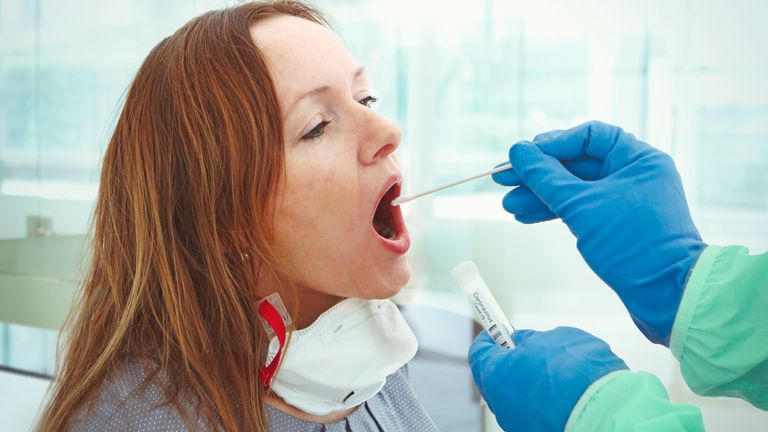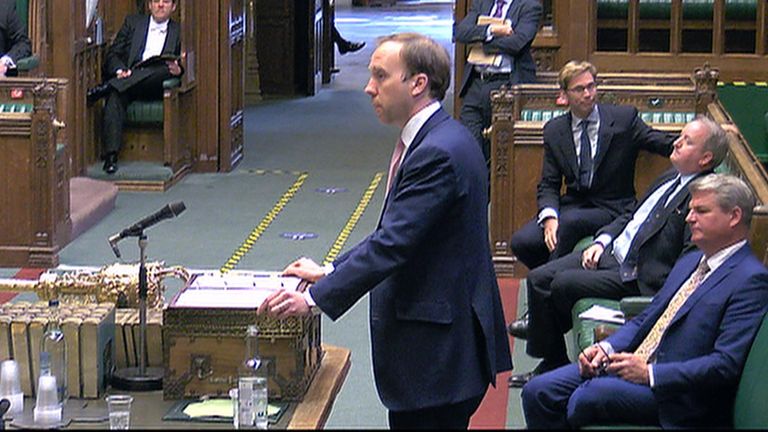People who have lost their sense of smell or taste after catching COVID-19 have described the strange sensation of being able to eat lots of chilli flakes without any effect.
The government added the symptoms to the NHS list on Monday, weeks after experts first raised concerns that coronavirus cases were being missed because loss of taste and smell was not one of the recognised indicators.
Sky News has spoken to some of those who experienced the symptoms - known as anosmia - to get some idea of exactly what it's like.
'I ate a slice of lemon and it did nothing'
Marina Boterashvili, 30, from west London, is slowly getting her taste back after losing it when she started to feel ill on 4 May.
She told Sky News: "I realised I couldn't taste anything when I ate a slice of lemon and it did nothing to me.
"Then I was cooking with garlic and onion and I couldn't smell it at all, but my smell came back after a week.
"I really felt like eating salty and sour food but then I'd eat it and it would taste of nothing - I must have used so much salt.
"I put loads of chilli flakes in my pasta and it had no effect.
"One of the strangest things is not being able to taste the mint in toothpaste yet feeling the tingle.
"My taste has come back a bit now but everything tastes very mediocre. I can taste that I've put six cloves of garlic in my food but it does not feel like there's enough."
'I tried to smell Cajun spice mix every day for a week'
Harriet Woolard, 31, from south London, could not taste or smell anything for a week at the end of March and believes she contracted COVID-19 from her boyfriend, but the NHS was not testing then.
She told Sky News: "It started off as a cold, which wasn't thought of as a symptom then so we didn't think we had it.
"I then lost my sense of taste and smell for a week, and also had a headache for a week, then felt very fatigued.
"I was on high alert to lose my sense of smell because my boyfriend had lost it a few days before. We realised when we cooked something spicy and he couldn't taste it.
"He only lost it for two days, but I was smelling Cajun spice mix every day for a week and couldn't smell anything.
"I even put some Tabasco on my tongue and there was just nothing.
"I tried to bake bread and was told the starter had quite a strong smell but I couldn't smell anything.
"The first sourdough I made I couldn't really taste and definitely couldn't smell it which was disappointing."
How sense of smell is affected
Mr San Sunkaraneni, consultant rhinologist at the Royal Surrey County Hospital, said he was pleased the symptoms experienced by people like Marina and Harriet have now been added to the NHS list.
He said they have been recognised "for a number of months now" in national and international rhinology circles.
The surgeon explained that COVID-19 is causing a loss of smell and - because 80% of your perception of flavour is due to your sense of smell - that is why people feel their taste has been affected.
:: Listen to the Daily podcast on Apple Podcasts, Google Podcasts, Spotify, Spreaker
He told Sky News: "With coronavirus we don't fully understand what's causing the olfactory [smell] loss but usually you can lose your sense of smell through any nasal or sinus pathology, particularly polyps - inflammatory growths.
"If you remove those polyps their sense of smell can return because you're removing the blockage.
"A lot of patients in my normal sinus clinic will not have inflammatory nasal problems when they present - we assume therefore that it is due to a viral injury to the smell receptors or nerve fibres, and refer to it as post-viral olfactory nasal loss.
"It can happen after a cold, with a viral element that can cause permanent damage but we don't know yet with coronavirus if there will be lasting effects.
"However, the evidence so far seems to suggest that the loss of smell is self-limiting.
"In most of the cases that have been reported, people's sense of smell and taste returns after two or three weeks.
"But, it's good these symptoms have now been added to the list - if people experience a sudden loss of smell during the current COVID-19 pandemic, that should be an indication to self-isolate, if they cannot get a test.
"Our concern is that these people don't have more severe symptoms and may not realise they are potentially carriers who could infect others."
"smell" - Google News
May 19, 2020 at 12:46AM
https://ift.tt/2WJHKja
Coronavirus: Rhinologist explains how COVID-19 affects smell - and sufferers describe their symptoms - Sky News
"smell" - Google News
https://ift.tt/35zrwu1
https://ift.tt/3b8aPsv
Bagikan Berita Ini




















0 Response to "Coronavirus: Rhinologist explains how COVID-19 affects smell - and sufferers describe their symptoms - Sky News"
Post a Comment